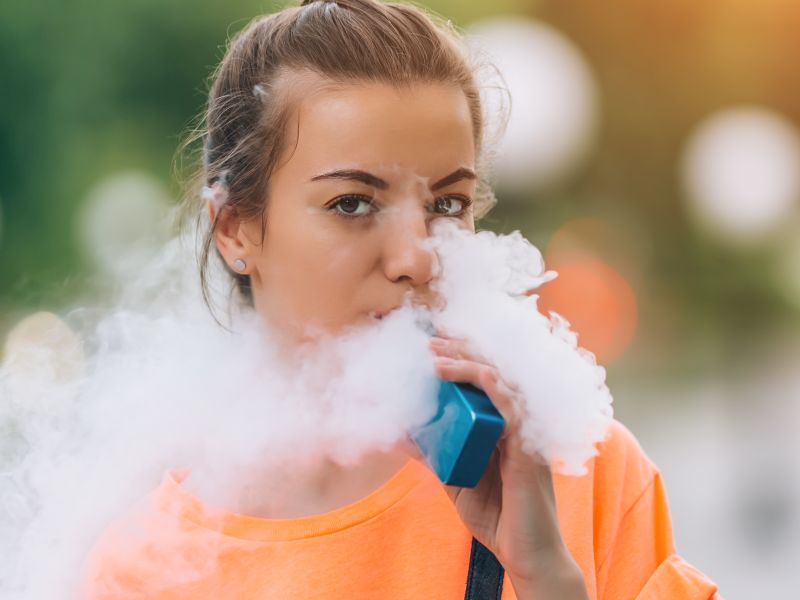Scientists Find Unsafe Levels of Known Carcinogen in Menthol E-Cigarettes
By Steven ReinbergHealthDay Reporter

MONDAY, Sept. 16, 2019 (HealthDay News) -- As doctors race to determine what is causing sudden and severe lung illnesses among some vapers, new research discovers dangerously high levels of a known carcinogen in menthol-flavored electronic cigarettes.
The chemical (pulegone) is used as a menthol and mint flavoring, even though it was recently banned in foods, the researchers said.
"If pulegone is not allowed in food, there's no reason why it should be allowed in e-cigarettes," said lead researcher Sven-Eric Jordt. He's an associate professor of anesthesiology at Duke University School of Medicine in Durham, N.C.
Because pulegone is known to cause lung and liver cancer in animals, the U.S. Food and Drug Administration banned its use in foods in 2018 after pressure from consumer groups, Jordt explained.
But the FDA does not regulate pulegone's use in e-cigarettes or smokeless tobacco, which are touted as safer than tobacco cigarettes, he added.
Jordt said that tobacco companies began removing pulegone from cigarettes in the 1960s and 1970s because it was an irritant and consumers didn't like it.
That same strategy didn't transfer to e-cigarette companies, which use pulegone because it's a lot less expensive than other menthol and mint flavorings, Jordt explained.
"Many are small companies that likely buy some cheap compound, maybe even a skin oil or an oil for lamps or something," he said. "They're just buying the least expensive thing they can add to get the flavor."
Reacting to a spate of severe lung infections tied to vaping and the soaring popularity of e-cigarettes among teens, the Trump administration announced last week that it would move to ban flavored e-cigarettes.
On Monday, New York Gov. Andrew Cuomo, a Democrat, said he would use an executive order to ban most flavored e-cigarettes in that state, with the notable exception of menthol flavor. Cuomo said he was not banning that flavor because it might help menthol cigarette smokers quit, but he added that might change in the future. On Sept. 4, Michigan became the first state to ban all flavored e-cigarettes.
According to Erika Sward, an assistant vice president for national advocacy at the American Lung Association, "We have a fundamental failure to protect the public from dangerous chemicals. And that is why FDA needs to step it up and why the public should not use e-cigarettes."
Sward also noted that e-cigarettes have only been on the market for about a decade, so the long-term effects of vaping aren't fully known yet.
"That's what the American Lung Association has been sounding the alarm bell about," she said. "The Wild West has been allowed to exist for too long. We're going to see the consequences of that for decades to come. So, don't use e-cigarettes."
For the study, Jordt and his colleague, Sairam Jabba, a Duke senior research associate, analyzed several brands of regular menthol cigarettes, three e-cigarette brands and one smokeless tobacco brand, all of which contained pulegone.
The researchers compared levels of pulegone in these products with the level of pulegone known to cause cancer in animals.
E-cigarettes and smokeless tobacco contained levels of pulegone higher than what the FDA considers safe. In regular menthol cigarettes, the level of pulegone was below the danger level, the researchers found.
Stanton Glantz is a professor of medicine at the Center for Tobacco Control, Research and Education at the University of California, San Francisco. He said, "This is a troubling study that highlights the fact that the FDA's continuing refusal to remove menthol from cigarettes and other tobacco products is harming people."
Glantz added that the FDA has announced that it will be suspending the sale of menthol e-cigarettes, but the official policy has not yet been released.
The research letter was published online Sept. 16 in JAMA Internal Medicine.
More information
The U.S. Centers for Disease Control and Prevention has more about vaping.

The news stories provided in Health News and our Health-E News Newsletter are a service of the nationally syndicated HealthDay® news and information company. Stories refer to national trends and breaking health news, and are not necessarily indicative of or always supported by our facility and providers. This information is provided for informational and educational purposes only, and is not intended to be a substitute for medical advice, diagnosis, or treatment.

